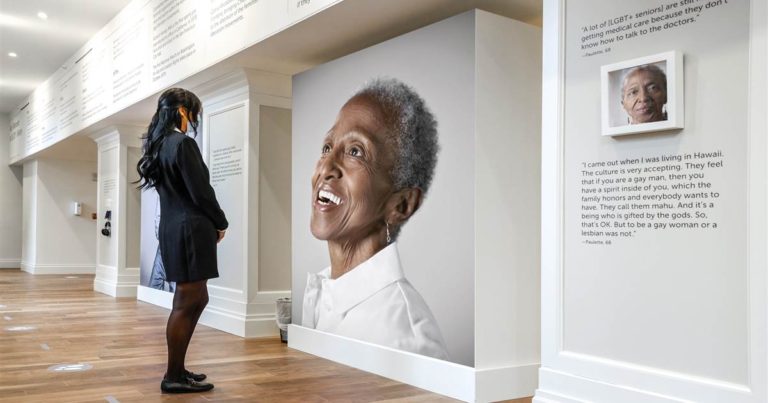

In the 1950s, when Ray Cunningham was just 19, he served in the Navy as secretary to the personnel officer aboard the USS Ranger. He was responsible for preparing discharge and reassignment paperwork, and sometimes he would have to dishonorably discharge men for being gay.
“It was difficult,” Cunningham, now 82, told NBC News. “At that time I realized that I was gay, and it was just difficult to know that people were being discharged for the same thing that I was in my life.”
“What bothered me the most was having to talk to the guys that were being discharged, and they were not in a good state of wellness anyway, because at that time, it was illegal or considered mental problems to be gay,” he said.
Cunningham spent the next four decades in the closet until he and his partner of 30 years, Richard Prescott, 78, came out after retiring in their 50s.
The two men, who are now married, shared their stories as part of “Not Another Second,” a new multimedia art exhibit in Brooklyn, New York, that features 12 LGBTQ elders, many of whom spent most of their lives in the proverbial closet. Through video interviews and interactive augmented-reality technology, visitors can experience their stories.
The other elders featured in the exhibit include the Rev. Goddess Magora Kennedy, who participated in the Stonewall uprising, and Paul Barby, who ran for Congress as an openly gay man in 1996 and 1998. Alongside each portrait is the number of years the elder was closeted.
“Not Another Second” is a joint project between SAGE, a national advocacy group for LGBTQ elders, and Watermark Retirement Communities. The exhibit debuted Tuesday at The Watermark in Brooklyn Heights, where it will remain until March. After that, it will tour the country and make stops in Los Angeles; Napa, California; and Tucson, Arizona; among other cities.
Ines Newby, senior marketing and creative director at Watermark, found the elders first by reaching out to dozens of the company’s properties to ask if they had LGBTQ residents who would like to share their story, but she said it wasn’t easy.
“I got a lot of responses from executive directors who said, ‘We do have someone living here, but they’re actually not out in the community,’” she said. “And in some cases, they were out, but they just didn’t feel comfortable sharing their story.”
Eventually, she found seven Watermark residents who were willing to participate and then partnered with SAGE to find five more. The fact that some people still weren’t ready to share their stories during Newby’s initial search speaks to “that compulsion to stay in the closet” that older LGBTQ people still feel, according to Christina DaCosta, director of communications for SAGE.
“That’s really what the campaign has tried to highlight — these hours, these minutes, these years lost to being in the closet,” DaCosta said. “It’s my hope that this campaign gives people a little hope and a little bit more freedom, maybe, to feel like they can share their authentic selves and stories, and if not, just give them a little bit of a sense of community that they’re not alone.”
Living a ‘double life’
Cunningham said he realized he was gay as a teenager, but he didn’t know the word “gay” at the time — he just knew he was different. After joining the Navy, he said he realized he was “more than different.”
“I had a label at that time,” he said of the realization, “and I didn’t like it.” He said he “felt trapped” and feared he, too, would be discharged. Feeling like he had no other options, he lived a “double life.”
As for Prescott, he said he knew he was different by the time he was 5 or so.
“I had two older brothers and a very strict father, and they used the word ‘sissy’ and ‘queer’ quite a bit,” he recalled.
He joined the Navy Reserve in 1959. On his first trip to Japan, he refused to visit the brothels with the men he worked with, and as a result, one of them began physically and verbally harassing him, he said.
“He was constantly making innuendos, evenly physically towards me,” he said. “It just infuriated me that he would violate my space like that.”